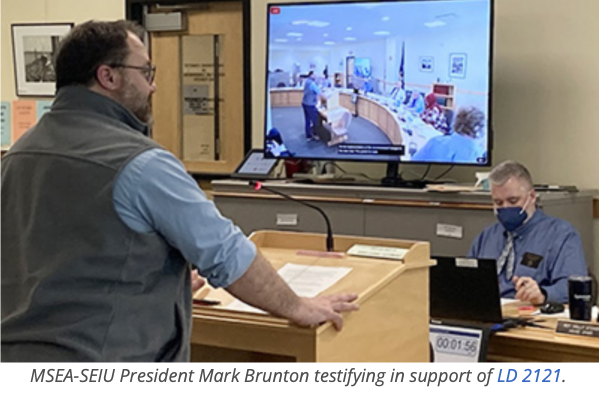PHOTO: Ferry workers tell Gov. Mills to close the pay gap for state employees.
Last week, union members with Professional Firefighters of Maine, IAFF 740, Machinists (IAM) S-89, the Maine Building & Construction Trades and others showed up in support of our MSEA SEIU 1989 brothers and sisters working in state government at a public hearing for a bill that would address the yawning pay gap for state employees. Numerous state employees from various departments spoke of how stagnant pay is causing massive staffing shortages as the state can’t compete with wages in the private sector.
Captain Aaron Sheridan of Cushing, a licensed mariner who pilots a $15 million ferry carrying people back and forth to the islands for the Maine State Ferry Service, said when he started the job nearly twenty years ago, the pay was lower than the private sector, but the benefits were great. But over the years, benefits have been cut and wages have not kept up with the soaring cost of living.
Sheridan said able seaman and engineers have received ample increases to their pay with stipends, and were able to receive a retention bonus just for showing up to work. However, captains in the Ferry Service could only qualify for a retention bonus if they worked three 80-hour work rotations, which means being home one week a month with their families.
“In the past, I have made personal sacrifices to make sure that the boats would keep running. I would fill in at any position that I am licensed, for the sake of the islands we represent, and the people who depend on us to maintain this service,” said Sheridan. “This isn’t only me making tough sacrifices, other Captains have to do the same, but we are not worthy of the same treatment… I just want to be treated equally and fairly considering my personal efforts and the efforts of the other Captains.”
LD 2121, “An Act to Address Chronic Understaffing of State Government Positions,” sponsored by Rep. Drew Gattine (D-Westbrook, would provide $165 million in funding for a new compensation and classification system for state executive branch workers and boost their wages to compete with the private sector.
The new compensation and classification system would address the fact that two studies, one in 2020 and the other in 2009, show that state workers are underpaid by 15 percent, on average, compared to their public and private sector counterparts in Maine and New England. Staffing challenges have left state government with over 2,100 vacant positions. As MSEA notes, the recent record state budget surpluses have been a direct result of underpaying state workers and substantially understaffing quality services for years.
LD 2121 would also require the administration to report annually to the Maine Legislature on Executive Branch job vacancies. It would improve laws relating to recruitment and retention adjustments, and require the state to work with state employee unions to establish recruitment and retention programs targeting agencies experiencing chronic understaffing.
Captain Daniel Michael McNichol, a Port Captain out of Rockland, said that crew members are increasingly losing their earned vacation time because management has said they can’t take that time off. He said he’s seen several qualified crew members leave the Ferry Service because the pay scale is far below industry standards for most merchant mariners.
“Most of the mariners I work with are tired of traveling out of state or the country for employment,” said McNichol. “So they look to be home in Maine and accept substandard wages. The American merchant mariner is a rare breed, and are becoming scarcer and older by the day. Mariners are much harder to hire and retain. Extra and fair compensation would assist our operations tremendously.”

Executive branch workers ratified a new two-year contract in December that included the state’s last, best final offer on wages as well as the tentative agreements that the Union Negotiations Team and management reached at the bargaining table. The contractual wage increases once again fell far short of what’s needed to close the ongoing state employee pay gap. The contract also included requirements that the State complete a new compensation study by Feb. 1, 2024 and resume bargaining with MSEA to close the pay gap.
Although they are not state employees, members of the International Association of Firefighters submitted testimony in favor of the bill. Portland Firefighter Caroline St. Pierre (IAFF 740) wrote that she works shifts in the Portland Regional Communication Center, which is critically understaffed due to the pay gap. This is causing dispatchers to work several sixteen-hour days in a row, she wrote.
“They are tired, stressed and struggle to have any normalcy in their personal life. Some of them drive at least an hour home after a very long, busy shift. This is dangerous,” said St. Pierre. “Not only am I concerned for the well being of our dispatchers, I am concerned how this affects the responders on the street. When there isn’t enough staff in the room, things can get missed and the safety of our firefighters and police officers is at risk.”
Speaking on behalf of the Mills administration, Department of Administrative and Financial Services (DAFS) Commissioner Kristen Figueroa denied that there was a pay gap problem and blamed understaffing on national labor market trends. Machinists S-89 President Carol Sanborn blasted Figueroa’s report for “making up statistics to fit [a] narrative.”
“They have said you can’t compare our wages to other states, yet they use statistics from other states to support their arguments when they want to,” said Sanborn. “They lauded their starting wage of $15 per hour. Well, Maine’s minimum wage is $14.15 an hour. Where is the glory in a starting wage of $15 an hour for state services?!”

